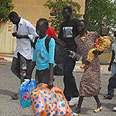A distressing and worrying development is unfolding in our Negev, far from the State's decision-making centers. Every night some 40 to 50 African refugees cross the Israeli-Egyptian border; they raise their hands and turn themselves in to the Israeli forces. According to IDF data, from the beginning of the year up until last week some 12,000 refugees and labor seekers from various African countries came through the Egyptian border and the quota is growing daily.
The IDF claims – and justifiably so according to its point of view – that it is not its duty to care for refugees entering Israel under tragic circumstances. Therefore, the military generally abandons the refugees on the doorstep of the southern district police headquarters.
Israeli troops, generally sensitive reserve soldiers, check the refugees to ascertain they are not terrorists and then they take their "guests" into the military base. They provide them with showers, food and water, diapers, baby formula, and basic medicine for those in need. After a few hours the refugees are loaded onto trucks and transported to the Emek Sara industrial zone on the outskirts of Beer Sheba where they are left to their fate.
Seeking help
Tamar Dressler
About 400 Sudanese refugees who crossed border into Israel from Egypt are working in Dead Sea and Eilat hotels, while 170 of them, including 40 toddlers, live in southern Kibbutz Eilot. Due to lack of official policy on refugee problem, hotels and kibbutzim turn into improvised absorption agencies
The southern command states: "The majority of these infiltrators are illegal residents by definition and not war refugees from Sudan, hence it is the duty of the immigration police to absorb them and care for them."
The southern district police maintain – which is also justified – that there is no point in placing the problem of these refugees at its doorstep, as a government decision on the matter has yet to be made. Moreover, there is no point in apprehending these refugees: All the prisons are filled to capacity anyway, and there is nowhere to deport them to.
Thirdly, the Be'er Sheva municipality maintains – which is also justified – that it is willing and able to provide immediate care to a small amount of refugees arriving within its jurisdiction, but not to hundreds or thousands of people - certainly not without substantial government assistance.
This is where the main question arises: Where is the Israeli government? Why has the prime minister not appointed a team of experts to handle this matter during all these months? A team that would examine all aspects of the problem and provide a reasonable solution that would be assigned to the army, the police and the local authorities in the area. For whom and why are we waiting?
Senior officials in the southern command and the southern district police headquarters are asking – almost begging – that we bring the issue, with all its severity, to the public discourse. "Someone up there in the government has to come to his senses and to formulate an agreed and logical policy. It doesn't make sense that a reserve regiment commander would have to make a decision with such international implications," they say.
And meanwhile, in billionaire vbusinessman Arcadi Gaydamak's land, where there is no government, other elements are coming in and offering their wares: This week humanitarian sources began - along with the Islamic movement in the south – to plan the building of a tent city for the African refugees flocking to the Negev. A referral to Gaydamak, of course, is just a matter of time.

Sudanese refugees in Beer Sheba
Photo: Herzl Yosef
מומלצים















